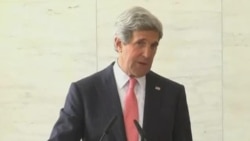The United States is urging Russia not to sell an advanced air defense system to Syria, which officials say could undermine the security of Israel. Zlatica Hoke reports the U.S. Secretary of States John Kerry addressed the issue following a two-day visit to Moscow.
Kerry told reporters in Rome Thursday that the United States appreciates Russia's cooperation in a renewed effort to end the bloody war in Syria. But he said Washington has always opposed supplying Syria's regime with missiles.
"The missiles, particularly the A-300, is potentially destabilizing with respect to the state of Israel, and so we have made it very clear historically that that is a concern of the United States," he said. "But again, I think drawing the - which is more important, relative balance, which is clearly going to be part of the negotiation in Geneva at this point, doesn't take us where we need to go, notwithstanding that we believe, as I said, that it is destabilizing.''
A recent report from Israel says Russia is poised to sell new advanced ground-to-air missiles to the Syrian regime, which has been engaged in a bloody two-year civil war.
Analyst Marc Gerecht, of the Foundation for Defense of Democracies, expects an escalation of fighting in Syria despite Kerry's efforts in Russia.
"I think it's going to get a lot, lot worse," he said. "I would just add [that] if the Russians do attempt the delivery of the S-300 and the S-400 missiles, I think you can be quite confident that the Israelis will strike very quickly and they'll do so with American approval. I don't think there's any doubt about that. But that issue aside, I don't see any peaceful solution to this conflict. I think we are just going to have a much, much bloodier war."
Some U.S. politicians, including Senator Robert Menendez, want to send better arms to the opposition forces in Syria to help depose the regime of President Bashar al-Assad.
"There has to be a change in the tipping point here. And after two years, I believe that there are those in the opposition, rebels that we can and have thoroughly vetted, that we can assist in trying to change that tipping point," he said. "If you have a monopoly on air power and an artillery, then the reality is you won't see a change on the ground."
But analyst Marc Gerecht said the presence of radical groups in the protracted war makes it difficult to garner support for more U.S. action in Syria.
Kerry told reporters in Rome Thursday that the United States appreciates Russia's cooperation in a renewed effort to end the bloody war in Syria. But he said Washington has always opposed supplying Syria's regime with missiles.
"The missiles, particularly the A-300, is potentially destabilizing with respect to the state of Israel, and so we have made it very clear historically that that is a concern of the United States," he said. "But again, I think drawing the - which is more important, relative balance, which is clearly going to be part of the negotiation in Geneva at this point, doesn't take us where we need to go, notwithstanding that we believe, as I said, that it is destabilizing.''
A recent report from Israel says Russia is poised to sell new advanced ground-to-air missiles to the Syrian regime, which has been engaged in a bloody two-year civil war.
Analyst Marc Gerecht, of the Foundation for Defense of Democracies, expects an escalation of fighting in Syria despite Kerry's efforts in Russia.
"I think it's going to get a lot, lot worse," he said. "I would just add [that] if the Russians do attempt the delivery of the S-300 and the S-400 missiles, I think you can be quite confident that the Israelis will strike very quickly and they'll do so with American approval. I don't think there's any doubt about that. But that issue aside, I don't see any peaceful solution to this conflict. I think we are just going to have a much, much bloodier war."
Some U.S. politicians, including Senator Robert Menendez, want to send better arms to the opposition forces in Syria to help depose the regime of President Bashar al-Assad.
"There has to be a change in the tipping point here. And after two years, I believe that there are those in the opposition, rebels that we can and have thoroughly vetted, that we can assist in trying to change that tipping point," he said. "If you have a monopoly on air power and an artillery, then the reality is you won't see a change on the ground."
But analyst Marc Gerecht said the presence of radical groups in the protracted war makes it difficult to garner support for more U.S. action in Syria.





